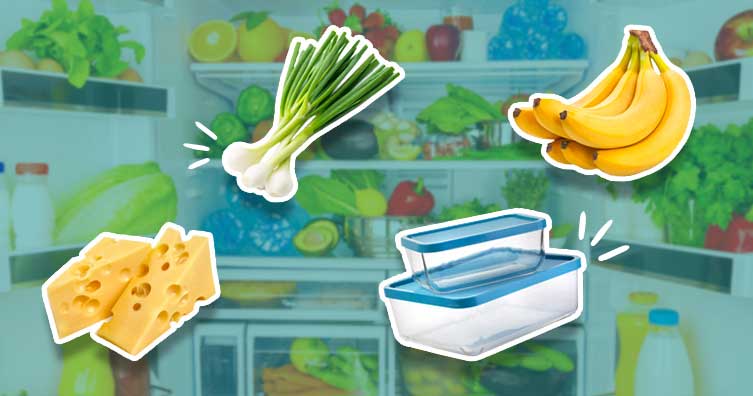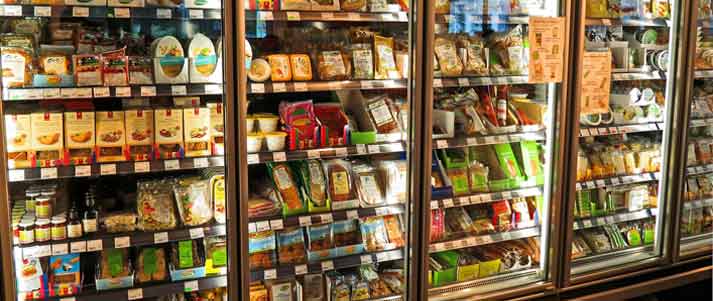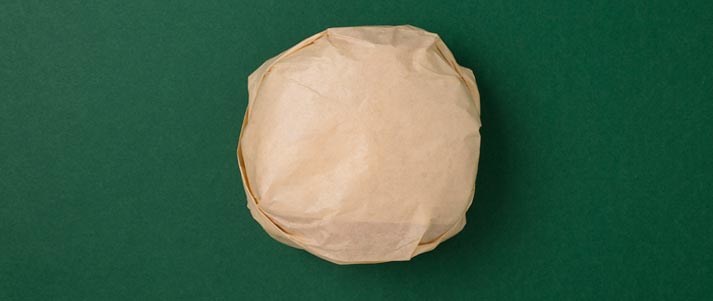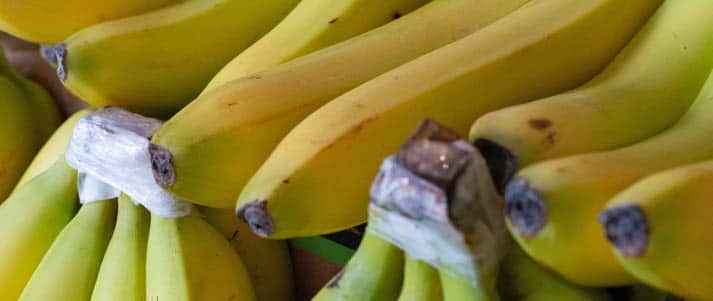How to store food and keep it fresh for longer
There's nothing more soul-destroying than watching your food whither away in front of your eyes. Those days are over. Here's how to keep food fresh for longer (with and without a fridge).

Credit: Anna Om, bergamont, GSDesign, Nuttapong, AlenKadr – Shutterstock
Buying in bulk – or at least opting for bigger shopping loads – rather than nipping out for bits and pieces every day will save you a ton of money at the supermarket.
But if everything is set to go mouldy in a day or two, you've either got to wave goodbye to the savings, or scoff five times more food than you normally would just so you can avoid the pain of watching it rot.
So how can you save yourself some money and avoid wasting food? And what really is the deal with the best-before date? Buckle up for our best food storage tips – you're in for a (fully edible) treat.
15 ways to make food last longer
Here are the best tips on how to keep food fresh:
-
See best-before dates as a guideline

One of the biggest misconceptions about the food industry is that you can't eat food after the best-before date has passed. The truth? It's actually just a recommendation.
A best-before date just tells you how long the product will be in prime condition for, and in many cases, it will taste just dandy after that anyway.
While it's generally a case of looking at the food and using your common sense to see if it's edible, a general rule of thumb is that it'll be okay for a couple of days more than what it says on the label.
To reiterate: eating food after its best-before date is totally safe and fine. Just make sure it passes the visual and smell test first.
-
Know the difference between use-by dates and best-before dates
It's okay to eat stuff after the best-before date, as that particular date just refers to when the manufacturer thinks the food is in its prime. But with use-by dates, you should be a bit more careful.
The use-by date is more of a safety measure, to give you an idea of when food could be potentially dangerous to eat.
With 'high-risk' foods such as meat, fish and dairy, it's always better to be on the safe side and throw it out if the use-by date has passed. Food poisoning isn't fun.
That said, use-by dates don't kick in the minute the clock strikes midnight. If your milk went out of date yesterday and it's only 7am, it's probably still okay. Just exercise caution...
-
Cook or freeze meat and vegetables
If your food is on its way out and you don't want to waste it, cook it up into something that can then be stored for longer (even if your version of 'cooking' just involves putting it in the microwave).
For example, if your mince is about to go off, make it into spag bol and it'll keep in the fridge for another three to five days since the mincemeat will be cooked.
Equally, vegetables on the way out will make for a great soup.
Otherwise, chuck it in the freezer. You'd be surprised at what foods you can freeze – but make sure the food hasn't already gone off, otherwise freezing it won't be much help to anyone.
-
Wrap cheese in paper

Credit: JpedPhotographer – Shutterstock
There's a tendency to think the best way to keep cheese fresh (and to keep it from stinking the whole fridge/kitchen/entire flat out) is to wrap it up good and proper.
You're not wrong in thinking you should be bundling it up — but paying attention to what you're wrapping it in could make all the difference. So, what should you wrap cheese in?
The short answer: porous paper. We're talking something like baking paper, rather than cling film, so it can still breathe.
Some say that it also helps to put cheese in kitchen towel that has some vinegar sprinkled on it, as this works to kill off any bacteria forming on the surface of the cheese.
-
Treat herbs like flowers
Keeping herbs fresh for longer is a real tough one. If we're being totally honest, how many of us can say we've managed to use up a whole bunch of fresh herbs before they've gone sad and slimey?
Everyone has their own method of keeping herbs fresh – some swear by wrapping them up in newspaper before popping them in the fridge, as this will keep them dry and also prevent them from getting too chilled.
Another option is to put them in a glass of water and place a plastic bag over the top.
Adding an elastic band (to hold the bag to the glass) will create a greenhouse environment for the herbs, which should keep them fresher for longer (the same goes for asparagus).
Otherwise, you can also dry herbs out by tying them together at the stem and hanging them near a window in a dry spot. Oily herbs like thyme and rosemary are best kept this way regardless, as they don't cope so well in the fridge.
Many recipe box delivery companies send you the exact quantity of each ingredient, so there's never any food waste. -
Wrap broccoli in foil
If you're wondering how to store food like celery or broccoli, it may be easier than you think. You can tightly wrap them up in tin foil and pop them in the fridge. This way, it can last up to four weeks.
This is because tin foil will keep the veggies clean and fresh, but it's porous enough to allow any ethylene (a ripening hormone) to escape.
-
Store onions in tights

Finally, the day has come – you've found a practical use for all those completely unwearable tights covered in ladders. A super-easy way to upcycle your old clothes.
As mental as you may feel putting this plan into action, storing onions in old pairs of tights and hanging them in a dark cupboard can make them last for up to eight months.
Keeping them in a dark place and giving them as much air around them as possible is the key to making them last. By tying a knot in the tights between each onion, the onions won't touch each other, leaving even more air to flow around them.
Bonus tip: Never store onions along with potatoes – they spoil faster.
-
Wash berries in vinegar
Strawberries, raspberries, blueberries, blackberries... Whatever your faves are, wash them in a solution of one part vinegar and three parts water before putting them in the fridge.
This will kill off any bacteria that's already on the fruit, so the chances of anything growing on it whilst it's in the fridge are much lower.
And don't worry – as long as you keep the solution measurements right, you won't taste the vinegar.
-
Brush your avocado with lemon
This question is as old as time itself: how long can avocados be stored before they go bad?
Avocados are one of those annoying fruits that are pretty near impossible to get at their perfect stage – they’re either hard as a rock, or have skipped to the squidgy brown stage.
The trick with avocados is to let them ripen out of the fridge. When it seems just ready for eating (a bit squidgy to the touch but not too soft), you should put it in the fridge. This will preserve it at that stage until you're ready to devour it.
If you have half an avocado left over, keep the stone in and brush a bit of lemon on the exposed flesh to stop it from going brown. Problem solved.
-
Store lettuce with kitchen towel
As with fresh herbs, keeping lettuce leaves at their best is one of those things where everyone has their tried-and-trusted method.
However, the general consensus is that the less moisture involved, the better.
We've given pretty much every method a go and found that storing leaves (dried as much as possible first of all) in a container or food bag, with a piece of kitchen roll to pick up any excess moisture, is the most effective.
Just remember to change the kitchen towel every few days so it stays dry. And even if it does look a bit wilted, lettuce can still be eaten after its best.
-
Keep bananas away from everything

Bananas are the clingiest of fruits – separate a banana from its brothers and sisters and you'll see it turn sad and brown quicker than you expected.
So, how do you keep bananas from going brown?
The key is to keep them as a bunch, and go one step further by wrapping up the conjoined stalks tightly in cling film (removing and re-wrapping tightly again every time you remove one from the bunch).
This should prevent the ethylene in the stalks from reaching the rest of the bananas, and can apparently help bananas last up to five days longer.
Bananas emit more ethylene than any other fruit, so it's best to keep them separate from other fruits (on the other hand, if you've got some solid avocados or tomatoes, sticking them in a plastic bag with a banana for a day will ripen them up nicely).
-
Freeze spring onions in bottles
Like a bit of spring onion in your salad? Of course, you do, you're only human. But it seems almost impossible to get through the whole bunch before they go brown and gross.
Make your spring onions last for months by chopping them up, leaving them out to dry completely then freezing them in an empty water bottle.
As long as there’s no moisture when you close the bottle, you’ll easily be able to shake out a few portions daily without them sticking together and without any freezer burn.
-
Remove roots from root vegetables
If you tend to go for organic root veg with its roots still attached, that's all very nice and well – but make sure you remove the roots as soon as you get home.
As healthy and hearty as they look with their greens still attached, these actually steal the nutrients from the rest of the veg and will result in them dying out early.
-
Don't put your tomatoes in the fridge
You've probably been told this numerous times, but still struggle to be convinced: keep your tomatoes out of the fridge.
Much like avocados, keeping tomatoes in the fridge prevents them from ripening, meaning they can be a bit hard and watery straight from the cold (particularly if you've gone for larger supermarket tomatoes, which tend to be a bit pale and watery looking).
Keeping your tomatoes out of the fridge (but in a cool place) will allow them to ripen and for the flavours to develop. However, if they're already bright red and looking ripe to eat, fridging them can stave off the rotting process.
Bonus tip: If they're still on the vine, it's apparently best to keep them stem-down as it stops air from getting in and moisture from getting out.
-
Keep mushrooms in a paper bag
Another one best kept out of the fridge, mushrooms will last longer if they're in a cool, dry place.
Most suggest keeping them wrapped in paper or in a paper bag to reduce moisture levels as much as possible, as staying clean and dry is the key to mushroom longevity.
Bonus tip: If they go a bit too far on the dry side and look a little shrivelled, a quick run under the tap should see them plump back up again.
Meal prepping is a great way to use up any food before it goes off AND avoid cooking for the rest of the week.








